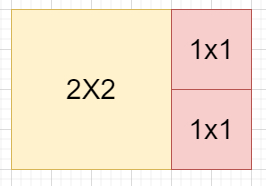
 Data Structure
Data Structure Networking
Networking RDBMS
RDBMS Operating System
Operating System Java
Java MS Excel
MS Excel iOS
iOS HTML
HTML CSS
CSS Android
Android Python
Python C Programming
C Programming C++
C++ C#
C# MongoDB
MongoDB MySQL
MySQL Javascript
Javascript PHP
PHP
- Selected Reading
- UPSC IAS Exams Notes
- Developer's Best Practices
- Questions and Answers
- Effective Resume Writing
- HR Interview Questions
- Computer Glossary
- Who is Who
Tiling a Rectangle with the Fewest Squares in C++
Suppose we have a rectangle of size n x m. We have to find the minimum number of integers sided square objects that can tile the rectangles.
So, if the input is like n = 2 and m = 3,

then the output will be 3, as we need three blocks.
To solve this, we will follow these steps −
Define one map m
res := inf
Define a function dfs(), this will take n, m, an array h, cnt,
-
if cnt >= res, then −
return
isFull := true
pos := -1, minH := inf
-
for initialize i := 1, when i <= n, update (increase i by 1), do −
-
if h[i] < m, then −
isFull := false
-
if h[i] < minH, then −
minH := h[i]
pos := i
-
-
if isFull is non-zero, then −
res := minimum of res and cnt
return
key := 0
base := m + 1
-
for initialize i := 1, when i <= n, update (increase i by 1), do −
key := key + h[i] * base
base := base * (m + 1)
-
if key is in s and s[key] <= cnt, then −
return
s[key] := cnt
end := pos
while (end + 1 <= n and h[end + 1] is same as h[pos] and (end + 1 - pos + 1 + minH)
-
<= m), do −
(increase end by 1)
-
for initialize j := end, when j >= pos, update (decrease j by 1), do −
curH := j - pos + 1
Define an array next of size n + 1
-
for initialize i := 1, when i <= n, update (increase i by 1), do −
next[i] := h[i]
-
for initialize k := pos, when k <= j, update (increase k by 1), do −
next[k] := next[k] + curH
dfs(n, m, next, cnt + 1)
From the main method do the following −
-
if n is same as m, then −
return 1
-
if n > m, then
swap(n, m)
Define an array h of size n + 1
dfs(n, m, h, 0)
return res
Let us see the following implementation to get better understanding −
Example
#include <bits/stdc++.h>
using namespace std;
class Solution {
public:
map<int, int> s;
int res = INT_MAX;
void dfs(int n, int m, vector<int> h, int cnt){
if (cnt >= res)
return;
bool isFull = true;
int pos = -1, minH = INT_MAX;
for (int i = 1; i <= n; i++) {
if (h[i] < m)
isFull = false;
if (h[i] < minH) {
minH = h[i];
pos = i;
}
}
if (isFull) {
res = min(res, cnt);
return;
}
long key = 0;
long base = m + 1;
for (int i = 1; i <= n; i++) {
key += h[i] * base;
base *= m + 1;
}
if (s.find(key) != s.end() && s[key] <= cnt)
return;
s[key] = cnt;
int end = pos;
while (end + 1 <= n && h[end + 1] == h[pos] && (end + 1 - pos + 1 + minH) <= m)
end++;
for (int j = end; j >= pos; j--) {
int curH = j - pos + 1;
vector<int> next(n + 1);
for (int i = 1; i <= n; i++)
next[i] = h[i];
for (int k = pos; k <= j; k++) {
next[k] += curH;
}
dfs(n, m, next, cnt + 1);
}
}
int tilingRectangle(int n, int m){
if (n == m)
return 1;
if (n > m)
swap(n, m);
vector<int> h(n + 1);
dfs(n, m, h, 0);
return res;
}
};
main(){
Solution ob;
cout << (ob.tilingRectangle(2, 3));
}
Input
2,3
Output
3

